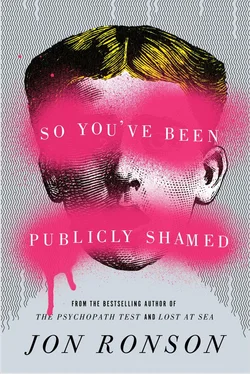“It was completely deliberate on my part,” he replied. “I planned it. I mapped it out. I carried it through. It was all done for a purpose. I thought I was doing something good at the time.”
—
After I put the phone down, I wondered if Dave had just told me a remarkable thing — something that might change the way the psychology of evil was taught. He might have just debunked the famous Stanford Prison Experiment. And so I sent a transcript of the interview to the crowd psychologists Steve Reicher and Alex Haslam. They’re professors of social psychology — Reicher at St Andrews University and Haslam at the University of Queensland. They’ve spent their careers studying Zimbardo’s work.
They both e-mailed me sounding totally unimpressed by the part I’d thought potentially sensational. “The ‘only acting’ line is a red herring,” Haslam wrote, “because if you are on the receiving end of brutality it doesn’t matter if the person was acting or not.”
“Acting is not ‘unserious,’” Reicher added. “Even if we are performing, the question remains, ‘Why did we act in a particular way?’”
But, they both wrote, the conversation with Dave Eshelman was indeed “fascinating and important,” as Reicher put it, but for a different reason to the one I’d thought. There was a smoking gun, but it was something I hadn’t noticed.
“The really interesting line,” Haslam wrote, “is I thought I was doing something good at the time . The phrase doing something good is quite critical.”
—
Doing something good. This was the opposite of LeBon’s and Zimbardo’s conclusions. An evil environment hadn’t turned Dave evil. Those hundred thousand people who piled on Justine Sacco hadn’t been infected with evil. “The irony of those people who use contagion as an explanation,” Steve Reicher e-mailed, “is that they saw the TV pictures of the London riots but they didn’t go out and riot themselves. It is never true that everyone helplessly joins in with others in a crowd. The riot police don’t join in with a rioting crowd. Contagion, it appears, is a problem for others.”
Then Reicher told me a story about the only time he ever went to a tennis match. “It was a ‘people’s day’ at Wimbledon, and the hoi polloi were allowed into the show courts. So we were on the number-one court. Three sides were ordinary folk, on the fourth were the members. The game we were watching was fairly boring. So people in the crowd started a Mexican wave. It went round the three ‘popular’ sides of the court and then the posh folk refused to rise. No contagion there! But the rest of the crowd waited just the time it would have taken for the wave to ripple through the fourth side. Time and again this happened, each time the masses — half jocular — urging the members to rise. And eventually they did in a rather embarrassed way. The ensuing cheer could be heard a long way away. Now, on the surface, perhaps, one might talk of contagion. But actually there is a far more interesting story about the limits of influence coinciding with the boundaries between groups, about class and power… Something contagion hides rather than elucidates. Even the most violent crowds are never simply an inchoate explosion. There are always patterns, and those patterns always reflect wider belief systems. So the question we have to ask — which ‘contagion’ can’t answer — is, How come people can come together, often spontaneously, often without leadership, and act together in ideologically intelligible ways? If you can answer that, you get a long way toward understanding human sociality. That is why, instead of being an aberration, crowds are so important and so fascinating.”
• • •
Philip Zimbardo’s assistant e-mailed. “Unfortunately he is declining all further interview obligations until mid-fall due to a full schedule.” It was February. I asked her if maybe she could let me know if he was going to be involved in any de-individuation projects. She said she wouldn’t. “I receive many many many requests of this sort daily and simply cannot keep up with the requests to remember to be in touch with individuals.” I told her I’d spoken to Dave Eshelman and asked if I could at least do a fact check with Dr. Zimbardo. “He may be able to answer a few short questions in mid-May via e-mail,” she replied. And so in May I sent her Dave Eshelman’s quotes. “Doesn’t the phrase ‘doing something good’ point to the opposite of Dr. Zimbardo’s conclusions?” I wrote. “Dave Eshelman hadn’t been infected by an evil environment. He was trying to be helpful.”
She forwarded my message to Dr. Zimbardo, writing: “Just send back to me! Or I fear he will continue corresponding with you directly!!” (I was accidentally copied in on the exchange.) Zimbardo e-mailed me back later that evening. “Please suspend your naiveté briefly,” he wrote. “Eshelman has publicly said he decided to be ‘the most cruel, abusive guard imaginable’ in videotaped interviews, that the prisoners were his ‘puppets,’ that he decided to push them as far as he could until they rebelled. They never did and he never let up. In fact, his degrading abuses escalated every night. Trying to be helpful? He created the evil environment that crushed innocent students and prisoners!”
—
Was Zimbardo right — and was I being naive? Was Dave soft-soaping his brutality all these years later? I did more research and discovered that I wasn’t the first person to have found the Zimbardo experiment a bit contrived. The Boston College psychologist Peter Gray — author of the widely used introductory textbook Psychology —published an essay in Psychology Today titled “Why Zimbardo’s Prison Experiment Isn’t in My Textbook.”
Twenty-one boys (OK, young men) [there were actually twenty-four] are asked to play a game of prisoners and guards. It’s 1971. There have recently been many news reports about prison riots and the brutality of guards. So, in this game, what are these young men supposed to do? Are they supposed to sit around talking pleasantly with one another about girlfriends, movies, and such? No, of course not. This is a study of prisoners and guards, so their job clearly is to act like prisoners and guards — or, more accurately, to act out their stereotyped views of what prisoners and guards do. Surely, Professor Zimbardo, who is right there watching them (as the Prison Superintendent) would be disappointed if, instead, they had just sat around chatting pleasantly and having tea. Much research has shown that participants in psychological experiments are highly motivated to do what they believe the researchers want them to do.
Gray felt Zimbardo’s critical error was in awarding himself the role of superintendent, instead of being some remote observer. And he was no aloof superintendent. Before the experiment began, he gave his guards a pep talk, as he later recounted in his own book The Lucifer Effect .
“We cannot physically abuse or torture them,” I said. “We can create boredom. We can create a sense of frustration. We can create fear in them, to some degree. We can create a notion of the arbitrariness that governs their lives, which are totally controlled by us, by the system, by you, me, [Warden] Jaffe. They’ll have no privacy at all, there will be constant surveillance — nothing they do will go unobserved. They will have no freedom of action. They will be able to do nothing and say nothing that we don’t permit. We’re going to take away their individuality in various ways. They’re going to be wearing uniforms, and at no time will anybody call them by name; they will have numbers and be called only by their numbers. In general, what all this should create in them is a sense of powerlessness. We have total power in the situation. They have none.”
Читать дальше












